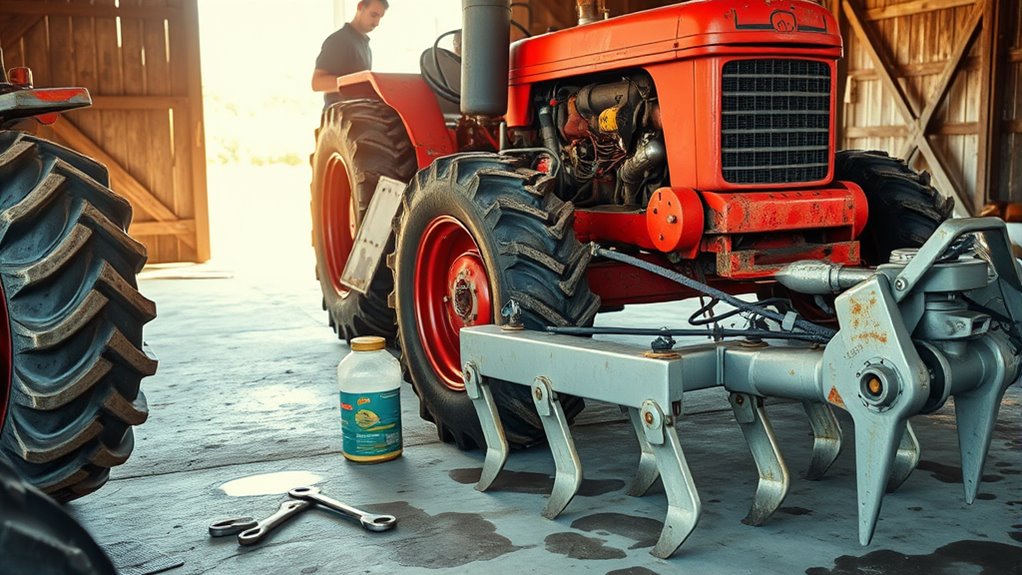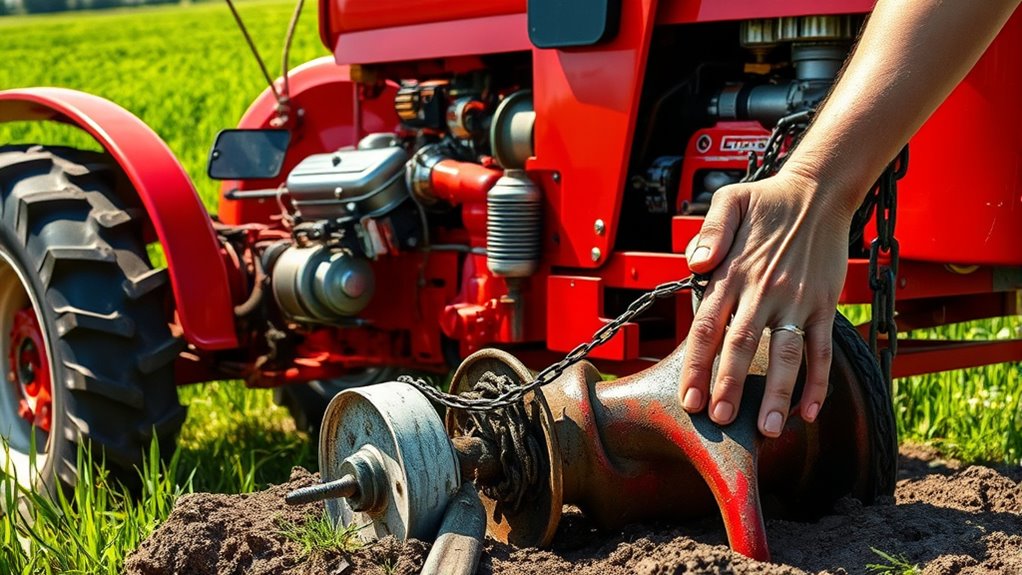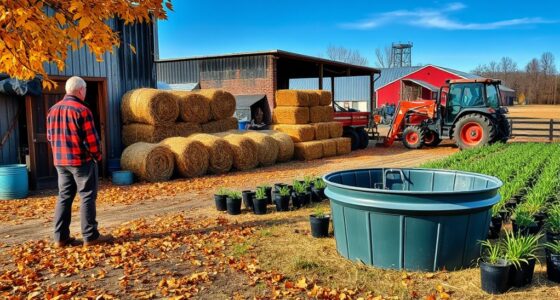To keep your tractors and tillers running smoothly, regularly check hydraulic hoses, connections, and fluid levels, and replace filters to prevent performance issues. Keep tires properly inflated to improve efficiency and safety, and inspect belts and chains for wear. Lubricate moving parts and monitor system pressure often. Consistent maintenance helps prevent breakdowns, extends equipment life, and keeps your farm productive. Staying on top of these steps can make a big difference—learn more to optimize your farm’s gear.
Key Takeaways
- Regularly inspect hydraulic hoses, connections, and fluid levels to prevent leaks and ensure system efficiency.
- Maintain proper tire pressure using a reliable gauge, adjusting when tires are cold, to improve safety and fuel economy.
- Change hydraulic filters and lubricate moving parts routinely to reduce wear and prevent equipment failure.
- Check belts, chains, and filters periodically, replacing damaged components promptly for reliable operation.
- Document maintenance schedules and inspections to track equipment condition and prevent unexpected downtime.

Maintaining farm equipment is fundamental for ensuring smooth operations and minimizing costly breakdowns. When it comes to tractors and tillers, paying attention to key components like the hydraulic system and tire pressure can make a significant difference in their performance and longevity. The hydraulic system powers many of the functions you rely on, such as lifting loads or adjusting attachments. Regularly inspecting hydraulic hoses and connections helps prevent leaks that could lead to equipment failure during critical tasks. Keep an eye out for any signs of wear or damage, and make sure hydraulic fluid levels are maintained at the recommended levels. Using the right type of hydraulic fluid is also indispensable, as it guarantees optimal operation and protects the system from corrosion or damage. Proper maintenance of hydraulic systems is crucial for preventing emergency repairs that can halt farm activities. Additionally, maintaining proper hydraulic pressure is vital to ensure consistent performance and avoid strain on components. Regularly checking for system pressure issues can help identify potential problems before they cause significant damage. Maintaining hydraulic system integrity through routine checks also helps extend the lifespan of your equipment and ensures reliable operation. A well-maintained hydraulic system also contributes to overall equipment efficiency, reducing the likelihood of unexpected failures. Tire pressure is another crucial aspect of farm equipment maintenance. Properly inflated tires improve fuel efficiency, provide better traction, and reduce wear and tear on the equipment. Under-inflated tires can cause uneven tire wear, increase fuel consumption, and make steering less responsive, which can be dangerous when operating heavy machinery. Over-inflated tires, on the other hand, may lead to a rougher ride and higher risk of blowouts. You should check tire pressure regularly, especially before long days in the field. Use a reliable gauge and follow the manufacturer’s recommended pressure levels, which are often printed on the tire sidewalls or in the equipment manual. Adjust the pressure as needed, and always do so when the tires are cold, since heat from operation can cause pressure readings to be inaccurate. Regular tire maintenance can also help prevent equipment downtime and extend the lifespan of your tires. Proper tire maintenance, along with hydraulic system upkeep, ensures your farm equipment remains dependable during peak seasons. Beyond hydraulic systems and tire pressure, maintaining proper lubrication, keeping filters clean, and inspecting belts and chains are essential. Regularly changing hydraulic filters and cleaning air filters ensures that dirt and debris don’t impair performance. Lubricating moving parts reduces friction and prevents premature wear. When inspecting belts and chains, look for signs of cracking or stretching, replacing them promptly to avoid breakdowns during busy seasons. Staying proactive with these maintenance practices also means you’re less likely to encounter unexpected downtime, saving you both time and money. Properly maintained equipment not only increases efficiency but also enhances safety during operation. Implementing a routine maintenance schedule and documenting inspections can help track the condition of your machinery and prevent overlooked issues.
Frequently Asked Questions
How Often Should I Change the Oil on My Tractor?
You should change your tractor’s oil regularly to keep it running smoothly. Typically, oil change intervals depend on your tractor’s usage and manufacturer’s recommendations, but a common schedule is every 100-200 hours of operation or at least once a year. Incorporating these oil changes into your tractor maintenance schedule helps prevent engine wear and keeps your equipment in top condition. Always check your owner’s manual for specific guidelines.
What Are Signs of a Failing Tractor Transmission?
Imagine your tractor’s transmission churning like a stormy sea. You might notice slipping gears, delays in engagement, or strange noises. A clutch adjustment might become necessary if the clutch feels stiff or unresponsive. Watch for a transmission fluid leak, which indicates a failing transmission. These signs suggest your tractor’s transmission needs attention before a breakdown, ensuring smooth operation and avoiding costly repairs down the line.
How Do I Properly Store Tillers During Winter?
To guarantee your tiller stays in good shape during winter storage, you need proper tiller maintenance. Start by cleaning it thoroughly, removing dirt and debris. Drain or stabilize the fuel, disconnect the spark plug, and store it in a dry, sheltered place. Cover the tiller with a breathable cover to prevent dust and moisture. These steps help protect your equipment, making sure it’s ready for use when spring arrives.
What Type of Fuel Is Best for Farm Equipment?
Imagine you’re optimizing your farm’s productivity. The best fuel for your equipment is high-quality, ethanol-free gasoline, which boosts fuel efficiency and reduces engine issues. For example, a farmer switched to premium fuel with fuel additives and saw better engine performance and less maintenance. Always choose clean, fresh fuel to guarantee smooth operation and longevity of your equipment, especially during busy seasons. Proper fuel choice keeps your machinery running efficiently all year.
How Can I Troubleshoot Engine Starting Issues?
When troubleshooting engine starting issues, start by checking the ignition system troubleshooting. Make sure the spark plugs are clean and properly connected. Next, perform battery health checks to verify your battery isn’t dead or weak. If the battery is fine, inspect the ignition switch and wiring for any damage. These steps help identify common problems that prevent your equipment from starting, making repairs quicker and easier.
Conclusion
Keeping your farm equipment in top shape is like tending a loyal team—when you care for it regularly, it performs smoothly and lasts longer. Don’t wait for a breakdown to act; instead, stay proactive with routine maintenance. Think of it as watering a plant—you nurture it now, and it’ll reward you with bountiful harvests later. By staying on top of upkeep, you ensure your farm runs like a well-oiled machine, ready for whatever the season brings.










